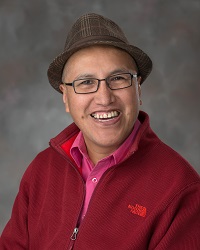
JOINED THE DEPARTMENT
2007
I am a historian of nineteenth- and twentieth- century Latin American nation-states and how they intersect with indigenous peoples and coloniality; my work particularly emphasizes race, ethnicity, gender, and sexuality. My book, Earth Politics: Coloniality, Religion and Bolivia's AMP Indigenous Intellectuals, 1921-1971 is currently under contract for publication by Duke University Press. I am now working on four new projects: 1) A study of indigenous women, land tenure, and civil rights in the private and public spheres from 1825 to 1971. This study will also address the Aymara cultural context and how indigenous women dealt with the experience of coloniality. 2) A history of Bolivian sexualities that will address homosexuality and heterosexuality between 1930-1980 by exploring specific cases in indigenous communities during a time when Bolivian patriarchy was being restructured. 3) A study of the young Evo Morales in the period from 1953 to 1979 that emphasizes the history of post-revolutionary Bolivia, global politics, and the Cold War. This work will consider discourses of masculinity and gender in the context of Morales's indigenous life and the long history of the Bolivian labor movement. 4) A comparative study of the Indian leaders Pablo Zarate Willka (1850-1905) in the Andes and Standing Bear (1834-1908) in the Great Plains. This comparative project will explore the making of alternative public spheres, ideas about citizenship, and their appropriation by North American Indians and South American indigenous peoples.
I teach a range of courses on Latin America and Caribbean history with an emphasis on Bolivia, Brazil, Chile, Peru, Argentina, and Guatemala. For lower-level undergraduates, I teach Power and Culture in Latin America, Colonial Latin America, Modern Latin America, and World History Post-1500. For upper level undergraduates and graduates I teach Race in Modern Latin America, Gender and Sexuality, History of Brazil, and Latin America and Global Relations. I occasionally teach in the honors program and the Latin American pro-seminar, which is cross-listed in other 5 departments.
TEACHING
Hist 171: Power and Culture in Latin America
Hist 171/ETHN 171: Latin American Civilization
Hist 271/ETHN 271: Colonial Latin America
Hist 272/ETHN 272: Modern Latin America
Hist 272: Latin American Republics
Hist 374/ETHN 374: History of Brazil
Hist 397: Colonial Andes
Hist 463/ETHN463: Indigenous Peoples of Latin America
Hist 471/871: Latin America and the Outside World (Fall 2007)
LAMS 478: Latin Studies Pro-Seminar: Race in Modern Latin America
Hist 395H: Homosexuality in Latin America
Hist 476B/ETHN476B: Race in Modern Latin America
Hist 476A/8776A, ETHN 476A, WMNS 476A/876A: Gender and Sexuality in Latin America
Hist 121: World History Post 1500
SELECTED HONORS AND AWARDS
- ACLS Fellowship, 2015-2016, amount $ 45,000
- Arts & Humanities Enhancement Fund Award at University of Nebraska- Lincoln, 2010
- Rockefeller Post-Doctoral Fellowship at the University of Texas (Race & Resources in Latin America), Austin, TX, 2002
BOOKS
- Earth Politics: Bolivia’s AMP Indigenous Intellectuals 1921-1971 (Duke University Press, 2014).
- Aruskipasiñasataki: El siglo XXI y el futuro del pueblo Aymara [Contemporary Aymara Movements and the Construction of Their Discourse]. (La Paz: Amuyañataki, 2001), editor.
- Tata Fermin [The Indian leader Fermin Vallejos and Indigenous Movements in the Southern part of Cochabamba]. (Cochabamba: Cenda, 1996), co-authored with Pablo Regasly, 1996.
- Historia de una esperanza: Milenarismo, Rebelión, Resistencia y Conciencia Campesina/Indígena [Economic Change and the Making of New Traditions]. (La Paz: Aruwiyiri, 1994).
ARTICLES
- “Framing and Disseminating the Indian Law and Toribio Miranda’s Jaqi Nationalism,” Anuario Estudios Bolivianos 2011 Sucre, Bolivia: ABNB, 2011:103-130.
- “Between Indian Law and Qullasuyu Nationaism: Gregorio Titiriku and the making of AMP indigenous Activists, 1921-1964,” Bolivian Studies Journal, 2010: 91-113.
- “Procesos de descolonización y la rueda de la historia en Bolivia” [Provincializing Bolivia: Five Centuries of Historicism], La identidad Latinoamérica en el tercer milenio- Encuentros del Bicentenario,” May 2009: 58-65.
- “Norma racial y genealogía del mestizaje en Bolivia, siglos XIX al presente” [Bolivia’s Racial Regulatory System and Mestizaje], Anuario 2008 de Estudios Bolivianos, 2009:143-153.
- “Indigenous Nationalism After 1952: The case of AMP Activist-Intellectual Andres Jachaqullu,” Anuario 2007 de Estudios Bolivianos. Sucre: Biblioteca Nacional de Bolivia, 2008: 1-30.
CONFERENCE PAPERS AND INVITED LECTURES
- “Against Coloniality: Andres and Matilide Jachaqullu’s Indigenous Movement and Its Resonances in Bolivia Under Evo Morales”, Becoming Indigenous, Asserting Indigeneity, Georgetown University, March 15-16, 2013
- “Finding Earth Politics in Indigenous Archives - 1921-1971”, American Historical Association Annual Meeting, Boston, MA., January 6-9, 2011
- “Framing and Disseminating Indian Law and Toribio Miranda’s Jaqi Nationalism”, Repositioning Indigeneity in Latin America, John Hopkins University, Baltimore, MD., November 4-6, 2010
- “Subaltern Strategies to Speak Out: Andres Jachaqullu in Times of Assimilation in Bolivia, 1942-1977”, Loyola University, October 26, 2009, New Orleans, LA
- “‘Qullasuyu Nationalism’, Alternative Modernity and Multi-focal Public Audiences: Bolivia’s AMP Indigenous Intellectuals Gregorio Titiriku and Rosa Ramos, 1921-1964”, American Historical Association Annual Meeting, New York City, N.Y., January 2, 2009
- “Earth Politics: Beginnings of Qullasuyu Nationalism, 1936-1960”, Indigenous Peoples Mapping New Terrain, Northwestern Univ. 8-9 May 2008
- “Bolivia at 2050: The Construction of the Indigenous Social Discourse”, Twentieth-First Century Nation Making Conference, Bolivian National Convention, Sucre, May, 2007
- “Fluidarity and Aboriginal Nationalism in Bolivia (1899-2005)”, Sawyer Seminar, New College, University of Toronto, Canada, November 17, 2006